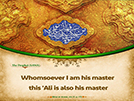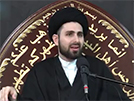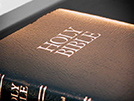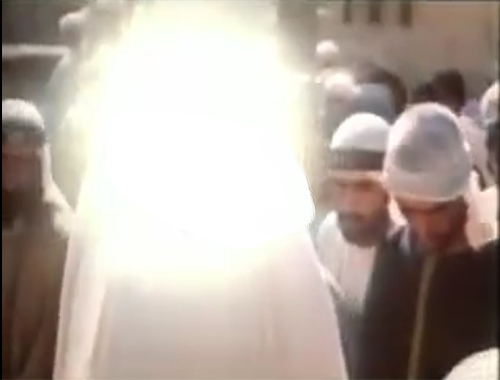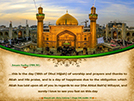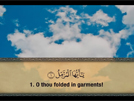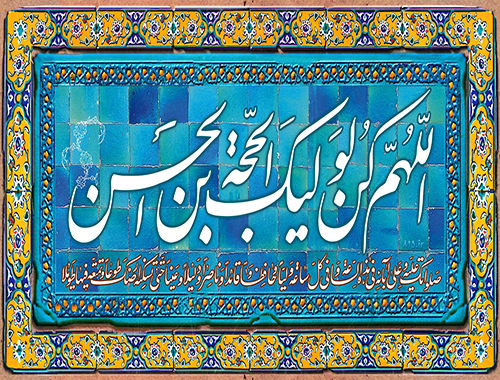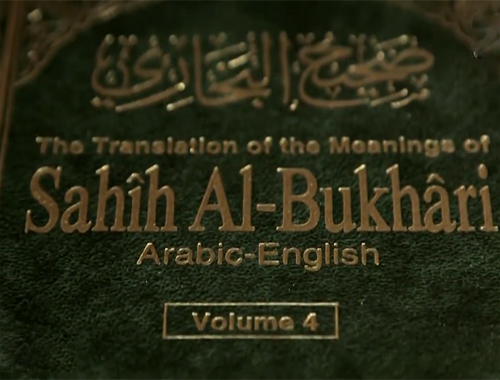verse67
- Details
- Hits: 2351
Section 10
The Christian Diviation from the Truth
Truth to be Proclaimed at all cost - The People of the Gospel do not act up to it - The errors which the Christians commit.
(67) يَا أَيُّهَا الرَّسُولُ بَلِّغْ مَا أُنزِلَ إِلَيْكَ مِن رَّبِّكَ وَإِن لَّمْ تَفْعَلْ فَمَا بَلَّغْتَ رِسَالَتَهُ وَاللّهُ يَعْصِمُكَ
مِنَ النَّاسِ إِنَّ اللّهَ لاَ يَهْدِي الْقَوْمَ الْكَافِرِينَ
67. " O' Messenger! convey what has been sent down to you from your Lord; and if you do not, then you have not conveyed His message (at all); and Allah will protect you from the (vice of) people, verily Allah does not guide the unbelieving ones. "
Commentary:
Appointment of the Successor as the Final Point of Prophetic Mission.
In this verse, only the Prophet (p.b.u.h.) is addressed. It states but his duty. The text of the verse begins with " O' Messenge! " and continues explicitly and emphatically commending him such:
" ... convey what has been sent down to you from your Lord; ... "
Then, for a further emphasis it warns him that if he refrains doing that, (that never might he refrain), he has not conveyed His message to people at all. The verse says:
" ... and if you do not, then you have not conveyed His message (at all); ... "
After that, the revelation consoles the Prophet (p.b.u.h.), as if he was anious and worried about a particular incident, and tells him not to be afraid of people for performing this duty. It says:
" ... and Allah will protect you from the (vice of) people, ... "
And, at the end of the verse, as a threat and punishment unto those who reject or deny this peculiar message and pertinaciously blaspheme it, the verse says:
" ... Verily Allah does not guide the unbelieving ones. "
Truely, what an important subject there existed in the latest months of the Prophet's life that in the above mentioned verse the lack of its conveyance has been counted equivalent with the lack of messengership wholly.
In different books of the scholars of both Sunnite and Shi'ah schools of thought, there are many traditions recorded to say that the above mentioned verse has been revealed at Qadir-i-Khum about the appointment of the successor for the Prophet (p.b.u.h.) and the future fate of Islam and Muslims.(1)
Qadir-i-Khum in Brief
In the last year of the Prophet's life the rites of Hajjat-ul-Wida' were very gloriously performed at the presence of the Prophet (p.b.u.h.).
In this journey, not only the inhabitants of Medina accompanied the holy Prophet (p.b.u.h.), but also Muslims of different parts of Arabia took part in the pilgrimage with the Prophet (p.b.u.h.) to gain a great historical honour and credit.
The sun of Arabia was showering heat as fire over mounts and valleys. But the sweetness of this spiritual journey made everything easy. It was nearly noon. The land of Juhfeh and, behind it, the hot dry deserts of Qadir-i-Khum were showing themselves from a distance.
It was on thirsday in the tenth A.H. (anno Hijira), just eight days after the Day of sacrifice. Suddenly the Prophet (p.b.u.h.) ordered half to the marching caravan.
The Prophet's Mu'azzin invited people to noon prayer with a loud voice of ' Allahu-Akbar '. People became ready for prayer while the weather was so hot that men had to put one side of their shoulder-mantles on the groumd under their feet and another side of it over their heads when establishing prayer.
When the noon prayer was established, people were going to go immediately into their small tents which they were carrying with them to shelter therein. But the Prophet (p.b.u.h.) informed them that everybody should attend to hearken a new Divine message. Then he announced that message through a full descried sermon.
Those people who were standing in a distance from the Prophet (p.b.u.h.) to listen to his lecture could not see him from behind the crowd. Therefore, a pulpit was prepared from the seats used at the back of the camels. The holy Prophet (p.b.u.h.) mounting the pulpit praised Allah and sought protection from Him. Then he addressed the huge crowd of people and said:
" Soon I am going to depart from among you by accepting the in vitation of Allah. I am responsible, and you are responsible, too. How do you bear witness about me? "
The audience shouted saying:
" We bear witness that certainly you have coveyed (the mission of messengership), advised (the circumstance of benevolence) and strived (to guide us). May, then, Allah reward you goodness. "
Then he (p.b.u.h.) questioned:
" Do you not bear witness to Unity of Allah, my messengership, the rightfulness of the Day of Resurrection, and raising the dead on that Day? "
The crowd answered: " Yes, We confess." The Prophet (p.b.u.h.) said:
" O' Lord! Be witness."
Again, he (p.b.u.h.) said: " O' people! Do you hear me? ... " The audience answered positirely, and then a silence dominated throughout the desert, so that there was heard nothing but the sound of the wind.
The Prophet (p.b.u.h.) said: " Now, look how do you treat with these two weighty and worthy things that I leave among you? "
A voice from among the crowd asked the Prophet (p.b.u.h.) what those two worthy things were.
The Prophet (p.b.u.h.) immediately said: " The first is the Greater Weight ', the Qur'an, whose one end is in Allah's hand and another and is in your hand. Never abandon it lest you might get astray! the second worthy thing is my progeny, my Ahlul-Bayt. And verily Allah, the sabtle, the Aware, informed me that never, never, will these too get separated from each other until they meet me at Heaven. Do not antieipate them both, because you will be perished; and be not behind-hand of those two, for you will be perished, too."
At that time, people saw that the Prophet (p.b.u.h.) was looking round as if he was looking for some one. As soon as he saw Ali (a.s.), he leaned ever and took his hand and raised it up so high that the whiteness of their arm-pits were appeared. All the crowd saw him (a.s.) and recognized him that he is the very ever victorious officer of Islam. Here, the Prophet's voice became louder and more audible when he said:
" O' people! who is superior (or the Master) among the people to the believers more than their own selves? "
They said: " Allah and the Prophet (p.b.u.h.) know better."
The Prophet (p.b.u.h.) said: " Allah is my master, and I am the master over the believers, and I am superior to them more than their own selves (my decision is superior to their decision)."
Then he (p.b.u.h.) added:
" To whomever I am the Maula (the master) this Ali is his Maula (the master)."
And he repeated this statememnt three times, or, as some narrators of the traditions have cited, he repeated it four times. After stating this commandment, he looked up towards heaven and prayed, saying:
" O' Allah! Be You a friend to him who is a friend to him (Ali) and (Be You) as enemy to him who is enmy to him (i.e. Ali).
Then he (p.b.u.h.) said to the audience: " Beware that all of you who are present should communicate this news to those who are absent."
The Prophet's sermon was comptered while sweat was showering from the faces of the Prophet (p.b.u.h), Ali (a.s.) and all people there because of the heat. Before separating the rows of the pilgrims, Ruh-ul-'Amin came down and revealed this verse to the Prophet (p.b.u.h.):
"...This day have I perfected your religion for you and have I completed My bounties on you and an pleased your religion to be Islam. ..." (1)
The Prophet (p.b.u.h.) said:
" Allah is the Greatest! Allah is the Greatest upon the perfetion of religion and completion of favour, and the Lord became a pleased with my messengership and Ali's mastership after me."
At this time there arose a sound of pleasure and uproar amongst people, and they congratulated this position to Ali (a.s.). Two people, out of those famous ones in the gathering who felicitated Ali (a.s.), were Abu-Bakr and 'Umar. It was at the presence of the crowd when they one after another ultered: Bakhkhin bakhkhin laka yabna Abi-Talib. Asbahta wa amsayta Moulace wa Maula kulle Mu'minin wa Mu'minah " (Hurrah, Hurrah, O' son O' son of Abu-Talib! you have now become my Maula (master) and the Maula (master) of every believing man and believing woman.)
This report is a brief explanation of the Qadeer-i-Khum which has been recorded in the scholars' books of both sunnie and Shi'ites.
An Explanation:
All of the Shi'ite commentators basing on Ahlul-Bayt's traditions, and also as some sunnite commentators, like fakhr-i-Razi and the author of Almanar. This verse is related to the mastership (wilayah) of Ali-ibn Abi-Talib and the event in Qadir-i-Khum.
The style of the tone and address of the verse distinguishes this verse from the verses before and after it. It is only in this verse through out of the Qur'an that the holy Prophet has been threatened due to the concedment of message. It announcis that if he does not convey that message, it is as if what he has conveyed during 23 years of his messengership will be reduced to nothing. Therefore, it must be noted what an important message it is which has been stated in that manner.
It is a message that , from the point of significance, is equivalent with all the messages of the whole period of his prophethood and messengership. That message is the mastership, Imammate, and leadership of Ali-ibn-Abi-Talib from the side of Allah.
O' Lord! Accept us and our children among the true followers of Ali and his progeny (a.s.) and cause us all to be mustered with them on the Day of Resurrection.
(1) Some of these books, compiled by both sects of Islams are as follows:
A)
1- Sunan-i-Ibn-Majih, vol.1, p. 55
2- Al-Fada'il, by 'Ahmad-Ibn-Hanbal (handwritten)
3- Khasa'is-un-Nisa'i, p. 21
4- Al-Kana wal-'Asma', by Dulabi, vol. 2, p. 61
5- Mushkil-ul-'Athar, by Taha wi, vol. 2, p. 307
6- Al-'Ighd-ul-Farid, vol. 3, p. 94
7- Al-'Isti'ab, vol. 2, p. 460
8- Tarikh-i-Baqdad, vol. 7, p. 377
9- Mustadrak-ul-Hakim, vol. 3, p. 110
10- Tarikh-i-Damishgh, vol. 2, p. 166
11- Tafsir-ul-Hafiz, by Ibn-Kathir, vol. 2, p. 14
B)
1- At-Tara'if, by Ibn-Tawus, p. 140
2- Managhib, by Ibn-Shahr'ashub, vol. 29, p. 228
3- The Book of Salim-Ibn-Qhays, p. 111
4- 'Ikmal-ud-Din, by Ash-Shaykh-us-Sadagh, vol. 1, p. 274
5- 'Ihlijaj, by Tabarsi, p. 663
6- Bihar-ul-'Anwar, vol. 37, p. 181, tradition 68
7- 'Ighbal-ul-'Ighbal, p. 663
8- Raudatul-Wa'izin, vol. 1, p. 89
9- 'Al-Yaghin, p. 343
10- Al-'Adad-il-Ghawiyyah, p. 169
11- 'At-Tahsin, p. 578
12- 'As-Sirat-ul-Mustaghim, vol. 1, p. 301
13- 'Al-Qadir, by Al-'Allamat-ul-'Amini
14- 'Abaghat-ul-'Anwar, by Al-'Allamah Mir-'Hamid Hussayn Al-Lakhunuy
15- 'Ihghagh-ul-Hagh, by Ghadi Nurullah, At-Tusturi; & tens of other books.
(2) The Qur'an, Sura Al-Ma'idah, No. 5, verse 3

